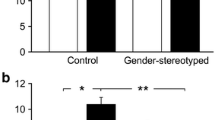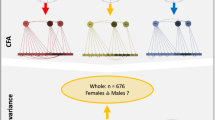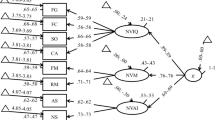Abstract
Studies of sex differences in cognitive functioning have been primarily descriptive. Results have been contradictory and inconclusive. Sex differences must be viewed from a functional point of view where similarities in overt behavior between males and females do not necessarily indicate that such behaviors are functionally equivalent. Theoretical basis for this proposition derives from the differential socialization experiences of males and females. Evidence from studies of cognitive styles and cognitive abilities of boys and girls, men and women, substantiate the basic thesis. Relationship between cognitive style and personality variables differ for boys and girls, even though mean and variability measures do not differ between boys and girls. For adults, similar differences in relationships between cognitive style and cognitive ability variables are found. Implications are discussed.
Similar content being viewed by others
References
BERKO, JEAN. The children’s learning of English morphology. In S. Saporta (Ed.), Psycholinguistics. New York: Holt, Rinehart & Winston, 1961.
DAVIDSON, K. S. & SARASON, S. B. Test anxiety and classroom observation. Child Developm., 1961, 32, 199–210.
KAGAN, J. MOSS, A. & SIGEL, I. E. The psychological significance of styles of conceptualization. In J. Wright & J. Kagan (Eds.), Basic cognitive processes in children. Monogr. Soc. Res., Child. Dev., 1963, 28, Whole No. 84.
MEYERS, C. E., ORPET, R. E., ATTWELL, A. A. & DINGMAN, H. F. Primary abilities at mental age six. Monogr. Soc. Res. Child Dev., 1962, 27, Whole No. 82.
OETZEL, ROBERTA. Selected bibliography on sex differences. Mimeographed paper compiled with the sponsorship of Social Science Research Council. Stanford University, 1962.
SARASON, S. B., DAVIDSON, K. S., LIGHTHALL, F. F., WAITE, R. R. & RUE-BUSH, B. K. Anxiety in elementary school children. New York: Wiley, 1960.
SIGEL, I. E. Cognitive style and personality dynamics. Interim Progress Report, National Institute of Mental Health, 1961.
THURSTONE, THELMA G. & JEFFREY, T. E. Closure flexibility (concealed figures) (Form A). Chicago: Education-Industry Service, 1956.
WITKIN, H. A., DYK, R. B., FATERSON, H. F., GOODENOUGH, D. R. & KARP, S. A. Psychological differentiation. New York: Wiley, 1962.
Author information
Authors and Affiliations
Additional information
This is a revised version of a paper entitled “Sex Differences Rediscovered” read at the 1963 Biennial Meeting of the Society for Research in Child Development, Berkeley, California, April 1963.
Financial support for the research reported herein came from Research Grant M-2983, National Institute of Mental Health, United States Public Health Service, the Social Research Foundation and the Teacher Experimental Education Project, Wayne State University, supported by a grant from the Ford Foundation, Dr. Edward A. Bantel, Director.
Rights and permissions
About this article
Cite this article
Sigel, I.E. Rationale for Separate Analyses of Male and Female Samples on Cognitive Tasks. Psychol Rec 15, 369–376 (1965). https://doi.org/10.1007/BF03393602
Published:
Issue Date:
DOI: https://doi.org/10.1007/BF03393602




